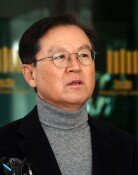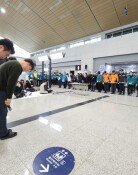Korea’s battery market sees minus growth for the first time
Korea’s battery market sees minus growth for the first time
Posted July. 11, 2024 07:52,
Updated July. 11, 2024 07:52
Sales in the Korean battery industry are expected to show negative growth for the first time in 14 years this year. With competitors posting ongoing growth, it is difficult to dismiss the sluggish performance as temporary slow growth due to the lack of maturity of the electric vehicle and secondary battery markets. Korea’s battery market is facing the biggest crisis against China, backed by its vast domestic electric vehicle and secondary battery market.
Among the three leading Korean battery companies, LG Energy Solution and SK On's annual sales this year are expected to decline by more than 10% compared to last year, while Samsung SDI is also expected to post a similar performance. Should such trends continue, the industry's size will decline for the first time since 2010, when sales data were compiled. Meanwhile, the sales of CATL and DYC, China’s top two companies, are expected to continue to deliver strong growth at 5% and 23%, respectively.
The global market share of the top three Korean battery companies, excluding China, fell from 57% three years ago to 47% from January to April. During the same period, the market share of Chinese companies surged from 14% to 31%. The technological competitiveness of Chinese lithium iron phosphate (LFP) batteries, which are cheaper but had lower performance than Korean batteries, has recently improved significantly and is rapidly dominating the market. Japan's Panasonic, the first company that invented cylindrical secondary batteries and supplies them to Tesla in the U.S., also decided to increase investment in its U.S. production facilities. As a latecomer in the field of LFP and cylindrical batteries, Korea is facing a difficult situation in which it must invest in overseas facilities and technology for advanced products while struggling in a stagnant market.
In addition, Korea relies on China for most of the three major minerals, which are nickel, lithium and cobalt, which account for half of battery costs, raising supply chain risks. While China swept up shares in 407 of the world's three major mineral mines, Korea only secured 15. It is said that Japan has secured 31 sites, twice the number of Korea, thanks to international trading companies' early efforts to develop overseas mineral resources. In addition, China is accelerating the pace of resource control in which the government directly controls the export of key minerals.
The global competition in the battery industry, including sanctions on imports of foreign batteries from the United States and the European Union (EU) and competition to secure the raw material supply chains, has significantly exceeded levels that can be handled at the individual company level. Batteries are Korea's 7th largest export item and a core industry that created more than 35,000 jobs. The government and political circles must provide full support measures to deal with challenges by competitors and promote the industry as a strong growth engine for the future.







